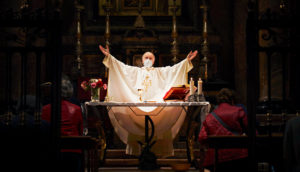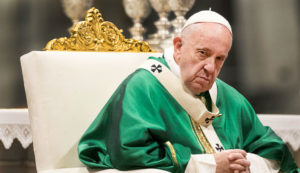“Retribution, it appears, is coming,” says the journalist Tom Newton Dunn. He is referring to the bishops in the House of Lords who had the temerity to collectively criticise the Government’s Rwanda policy. It “shames Britain”, the bishops said. Tory cabinet ministers are furious. “Only Iran also has clerics that sit in their legislature,” one told Newton Dunn. “They’ll go.”
They won’t, of course. The sort of constitutional changes that would be required to make this happen would make Brexit look like child’s play. And the public would have little tolerance for the months — no, years — of rancour spent defenestrating the British constitution. That the Conservative Party is even considering it shows how far out of touch the Tories are with the establishment — that cat’s cradle of interlaced institutions and social relations in which the country is held together. The Party used to value this historic legacy: it was created to conserve it. Chucking the bishops out of the Lords while leaving all those political appointments and Tory donors on the red benches gives off a clear message: King Boris doesn’t like to be crossed.
I used to think that the presence of unelected religious leaders in the Lords was an insult to democracy. It was bad for the country and, even more important, it was bad for the Church: it turned our senior clerics into pliant courtiers, who spent too much time raiding the 17th-century dressing-up box and camping about in pointless processions. It all seems a long way from the carpenter from Galilee. Absent from such deferential flummery, the Church would be free to become a more radical organisation, more aligned to its founding mission. In the US, the separation of church and state was not designed to protect the state from the church — but to protect the church from the state.
The glamour of power is a kind of spiritual kryptonite for clerics, and very few of us are unaffected by it. When I was at St Paul’s Cathedral, it was almost impossible for a sense of self-importance not to seep into your bones. It was all terribly insidious and corrosive; I don’t trust clerics who deny this. I well remember standing in the vestry at St Paul’s in my new canon’s cassock, adorned with a dashing row of red buttons to mark your status. Rowan Williams came into the vestry and looked me up and down, slightly mockingly. “Red buttons,” he said. “It always starts with red buttons.”
Power has a way of finding out your weaknesses. Like the rain, it gets into the cracks unnoticed, then splits you open when the freeze comes. Here is one example: some months before the red buttons comment, I was asked to chair a group that organised a large service for the livery companies at St Paul’s. The service ended with members of the livery returning to their halls for a huge slap-up lunch. I asked whether this was entirely appropriate, given that it was still Lent. Various reasons were given for why this was necessary, but I was marked up as a potential troublemaker.
That year, after the service, I was cleverly invited for lunch at one of the posher livery companies. I ate poached turbot and drank a delicious white burgundy; of the seven deadly sins, mine is probably gluttony. It was here they found me out. I never raised a serious question about the service again.
Yes, it always starts with red buttons. The establishment is a continual spiritual danger to the Church and to its representatives, our bishops. It has to be said, I believe that they are far more alert to these dangers than most, though all are vulnerable to them.
Despite all this, I have changed my mind about the bishops in the Lords. I now believe the Church’s involvement at the heart of the establishment is a risk worth taking. The British constitution is more a play than a book; more show than tell — just think of Black Rod banging on the door, the Trooping of the Colour, the Coronation. And the Church helps choreograph the establishment, thus introducing a moral element to our common life that would be difficult to maintain if Parliament were redesigned in a more rational way.
Above all, the bishops draw their moral authority from the fact that the Church of England operates a universal service provision. We serve in all communities, from the richest to the poorest, from cities to rural areas. The bishops are in fact well suited to the Lords because they connect it to every parish in the country — well, in England at least. And if there is a current threat to bishops in the Lords it comes not from the fact that they sometimes irritate the government with moral pronouncements — ‘twas ever thus — but rather because the bishops are dismantling the source of their own authority. Armed with half-arsed MBAs, they want the Church to be run with increasingly centralised efficiency; inefficient parishes are being closed. As a result, the connection between the bishops and the parishes is being severed, and with it the source of their authority to sit in the legislature.
The role of the bishops is to represent the whole country spiritually. On the whole, other faiths are glad of this particular role held by the Church of England. The National Secular Society and other troublemakers are keen to sow division among people of faith in order to argue that no one church should have legislative priority over another. But this is simply a ruse to dislodge religion from the public sphere. The Church of England is not a special interest group, it exists for all. Even, heaven help us, for secularists.
Which is why, though I happen to agree with them about Rwanda, I do worry when our bishops display this degree of political unanimity. If the Church of England is to claim support from all sections of society, it has to be a little more politically “big tent”. Soft-Left liberalism is not the same as the Gospel of Jesus Christ. And I can absolutely see how this elision irritates Tories no end.
But calling for the disestablishment of the Church of England is hardly the answer. From Thomas Becket to Bishop David Jenkins during the miners’ strike, irritating the government is a worthy tradition of moral dissent. The Church of England remains — just about — the Church “for England”, as the Archbishop of Canterbury keeps on reminding anyone who will listen. We are given a central role in curating our national life because we aim to hold the nation together; we connect our legislature to its past; we represent faith in its many forms; we don’t (shouldn’t anyway) do party politics; and we are not lackeys of the government. And, for all its faults, you probably won’t find another organisation that can do all of that.
Disclaimer
Some of the posts we share are controversial and we do not necessarily agree with them in the whole extend. Sometimes we agree with the content or part of it but we do not agree with the narration or language. Nevertheless we find them somehow interesting, valuable and/or informative or we share them, because we strongly believe in freedom of speech, free press and journalism. We strongly encourage you to have a critical approach to all the content, do your own research and analysis to build your own opinion.
We would be glad to have your feedback.
Source: UnHerd Read the original article here: https://unherd.com




